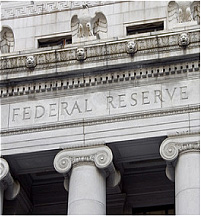| Anything You Can Do the Fed Can Do Better? |
 |
|
By Sam Batkins
Tuesday, September 01 2009 |
President Obama has now nominated Federal Reserve Chairman Ben Bernanke to a second term as the head of what some call the most powerful unelected body in the world. Bernanke has received praise for his efforts to ease the recession and to loosen credit markets in the wake of the recent financial crisis. However, a vocal minority of critics have begun to question not only the choices that the Federal Reserve has made lately but also the power and control that it wields. Free-market advocates generally approved of Bernanke’s famed predecessor, Alan Greenspan. Greenspan was once known as a prominent libertarian economist during the Reagan administration and worked closely with libertarian iconoclast Any Rand during the 60s. The current recession, however, has cast both Bernanke and Greenspan in a negative light and raised questions about the role of the Fed in U.S. monetary policy. Many critics claim that by keeping interest rates at well below the market rate in order to spur economic growth, the moderate growth earlier this decade was solely a product of a government-induced credit bubble. When inflation began to rise in 2005, the Fed had no choice but to back away from its easy money policy and increase interest rates. Higher interest rates tightened credit markets and raised mortgage payments for millions of Americans, and those higher (albeit expected) mortgage payments led to the worst housing shock since the Great Depression. The fervor over the decisions of Mr. Bernanke and Mr. Greenspan can be rightly criticized, but what is generally left unsaid is whether the Federal Reserve should possess such awesome power at all? Markets set interests rates all the time. As some critics question, why should an unelected body of appointees set monetary policy for over 300 million Americans and a $13 trillion economy? Of course, no one doubts the intellectual pedigree of Mr. Bernanke and Mr. Greenspan. Both were educated at the finest schools in the nation and both had a wealth of experience when they joined the Federal Reserve. Bernanke had even served on the Fed as a board member before he was elevated to chairman. But despite their relative genius, can any one person or group of people, no matter how smart, run an entire economy? Isn’t the Fed nothing more than a central-planner with a few gold-plated degrees on the wall? Famed economist Fredric A. Hayek would likely answer in the affirmative. Hayek, a Nobel Prize winner in his own right, penned “The Use of Knowledge in Society” in 1945. From a free-market perspective, it might be one of the most influential papers published on why markets are more efficient than government bodies. For example, Hayek noted that if any one individual possessed all knowledge about an economic scenario, then making decisions would merely be a matter of logic. Of course, no one person possesses all knowledge in any economy, and individuals and government actors are typically forced to work with disparate pieces of data to make economic decisions. Hayek wrote that “central planning based on statistical information by its nature cannot take direct account of these circumstances of time and place and that the central planner will have to find some way or other in which the decisions depending on them can be left to the ‘man on the spot.’” Hayek noted that this “knowledge problem” is best solved by a decentralized body of individuals, the market, to make economic decisions. Central planners must first aggregate knowledge from across a country, decide and then issue orders which may be stale as soon as they are executed. The “man on the spot,” on the contrary, can make decisions sooner and with none of the bureaucracy inherent in governmental entities. Hayek concluded, “If we can agree that the economic problem of society is mainly one of rapid adaptation to changes in the particular circumstances of time and place, it would seem to follow that the ultimate decisions must be left to the people who are familiar with these circumstances, who know directly of the relevant changes and of the resources immediately available to meet them.” So, as Chairman Bernanke begins his second term as head of the Federal Reserve, Americans hope that he makes the “right” decisions affecting inflation and credit markets. But, perhaps most Americans should instead imagine a system where a central body of “wise men” decides on the output of all steel in the United States or the output of all iPods based on old data. No matter how wise these central planners might be, they do not have the requisite knowledge needed to make decisions that a decentralized market could make instantaneously. |
Related Articles : |
























